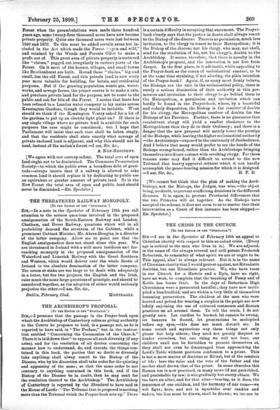THE ARCHBISHOP'S PROPOSAL.
(To THE EDITOR OP THE " SPECTATOR '1 presume that the passage in the Prayer-book upon which the Archbishop of Canterbury relies as giving authority to the Courts he proposes to hold, is a passage not, as he is reported to have said, in "The Preface," but in the instruc- tion entitled " Concerning the Ceremonies of the Church." There it is laid down that " to appease all such diversity (if any arise), and for the resolution of all doubts concerning the manner how to understand, do, and execute the things con- tained in this book, the parties that so doubt or diversely take anything' shall stymy resort to the Bishop of the Diocese, who by his discretion shall take order for the quieting and appeasing of the same; so that the same order be not contrary to anything contained in this book, and if the Bishop of the Diocese be in doubt, then he may send for the resolution thereof to the Archbishop." The Archbishop of Canterbury is reported by the Standard to have said in the House of Lords : " The Tribunal that is proposed is nothing more than the Tribunal which the Prayer-book sets up." There is a certain difficulty in accepting that statement. The Prayer- book clearly says that the parties in doubt shall always resort to the Bishop of the diocese. There is no permission, much less invitation, to the clergy to resort to their Metropolitan; it is the Bishop of the diocese, not his clergy, who may, not shall, send for the resolution of his, not his clergy's, doubts to the Archbishop. It seems, therefore, that there is novelty in the Archbishop's proposal, and the innovation is not free from danger. In the first place, is it advisable, while appealing to the Prayer-book as the canon of ecclesiastical conduct, to be at the same time straining, if not altering, the plain intention of the Prayer-book ? Again, if, as many most .firmly, believe, the Bishops are the unit in the ecclesiastical politY, there is surely a serious diminution of their authority in this per- mission and invitation to their clergy to go behind them to the Metropolitan, a permission and invitation which can hardly be found in the Prayer-book, where, by a beautiful and orderly disposition, the Bishop is the resolver of doubts for his clergy, the Metropolitan resolver of doubts for the Bishops of his Province. Further, there is no guarantee that recalcitrant clergy svill yield a readier obedience to the Metropolitans than they do to their Ordinary ; and there is a danger that the new proposal will merely lower the prestige of the Bishops, while leaving the higher ecclesiastical authority —the Archbishops—exposed to the contumely of disobedience. And I believe that many would prefer to see the hands of the Bishops strengthened, rather than the Archbishops bringing themselves into direct contact with revolting clergy. For these reasons some may find it difficult to extend to the new Tribunal that hearty approval without which it can hardly accomplish the peace-bearing mission for which it is designed.
[We cannot but think that the plan of making the Arch- bishops, not the Bishops, the Judges, was wise,—the object being, no doubt, to prevent conflicting decisions in the different dioceses. It is, again, to prevent Provincial differences that the two Primates will sit together. As the Bishops have accepted the scheme, it does not seem to us to matter that their intervention as a Court of first instance has been skipped.— ED. Spectator.]






































 Previous page
Previous page